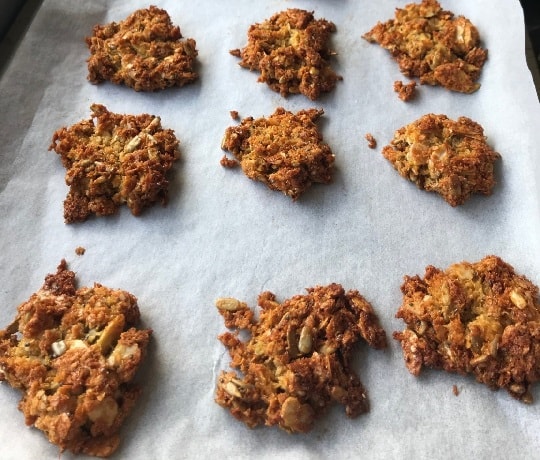Zoe Bingley-Pullin: How to combat stress with good nutrition

Do your eating habits change when you’re feeling stressed? Perhaps, like many, you reach for the wrong foods or maybe you eat virtually nothing at all? A well balanced diet is actually a powerful stress management tool. Conversely, when we eat poorly the symptoms of stress can be intensified.
In this article, I’ll outline the differences between healthy and unhealthy stress and what symptoms you should look out for. I’ll then cover the key nutrients your body needs to best handle stress and give you my top tips for eating well to stay on top of stress.
Healthy and unhealthy stress
Stress is the body's response to physical, mental or emotional situations and changes. Stress often occurs in response to situations that are perceived as being difficult to handle or threatening and can result from external factors such as events or the environment or our internal feelings. Think about public speaking or being up high in a tall building, both of these situations can be stressful for lots of people.
Believe it or not, short term stress is actually a natural, normal and healthy reaction to certain circumstances and can positively improve motivation or productivity. It should be quick to come on, of an appropriate degree and duration, and the stressful feeling should subside after the situation has passed. Chronic stress on the other hand is frequent and long term, and it’s not at all good for you.
The symptoms of chronic stress
Stress becomes unhealthy when the feelings remain after the stressful situation has ended. Chronic stress can have you in a constant state of fight-or-flight. This prolonged state can lead to debilitating symptoms which can impact mood, nutrition, physical and mental wellness and put you at risk of any number of health conditions. The warning signs of chronic stress to watch out for include:
- Headaches
- Frequent colds and flus
- Gastrointestinal upset including reflux, constipation or diarrhoea
- Insomnia
- Chest pain and rapid heart rate
- Feelings of overwhelm
- Being disorganised or forgetful
- Changes in appetite – eating too little or too much
- Behaviours such as nail biting or pacing
- Nervousness, shaking, sweaty hands
- Skin and hair problems such as acne, eczema or hair loss
Diet as a stress management technique
Scientists have now made the connection between nutrition and our ability to handle stress. A healthy diet, rich in certain nutrients can be effective in boosting wellbeing and moderating against some of the symptoms of stress. Here are the key stress-reducing nutrients and common food sources:
Magnesium – is a calming mineral for the nervous system and one that is often depleted when under stress. Include magnesium rich foods in your diet such as nuts, seeds, wholegrains, fish, tofu, legumes, avocado, dark chocolate, bananas and leafy greens.
B vitamins – are important to protect us against stress and depression. They can’t be stored in the body so we need a good supply every day. Foods that are high in B Vitamins include meat, dairy, eggs, wholegrains, legumes, nuts, seeds and dark leafy veg. Beware that sugar, caffeine and too much alcohol can all destroy B vitamins and leave you vulnerable.
Omega-3 – fish oil has been shown to reduce cortisol and adrenaline levels associated with stress. Try for 2-3 serves of oily fish per week, including salmon, sardines and mackerel. If you aren’t a fish fan, try hemp seeds, chia seeds, flaxseeds or walnuts, to boost your plant-based omega-3 intake.
Antioxidants A, C & E – Vitamin A, C and E are all powerful antioxidants that scavenge for free radicals (unstable chemicals that can damage cells in the body, commonly caused by stress). Maximise your intake of antioxidants by eating a rainbow of colourful plant foods.
Vitamin D – this “sunshine vitamin” is obtained by exposure to the sun and can be depleted by high levels of cortisol.
Tips to help you eat right to reduce stress
- Planning – I know, it sounds boring but putting some forethought into what you’re going to eat for the day or week ahead really can help you stay on track with eating healthy, calming foods and reduce worry about what to eat. For more information on how you can learn to meal plan in 5 minutes per week, refer to my earlier blog post.
- Eat Breakfast – Getting a good healthy start to the day can help you curb feelings of hunger and carry that healthy eating through the rest of the day. Studies show that people who eat a protein rich breakfast are less likely to snack during the day and into the night. Good breakfast options with nutrients to help you manage stress include eggs, tofu, yoghurt, nuts and seeds, beans, salmon, low fat cheese or plant based protein powders.
- Healthy Snacking – The trick to snacking well is to have the healthy stuff on hand so you don’t resort to the vending machine or biscuit tin when hunger strikes. Healthy choices include vege sticks and hummus, a handful of nuts, a tub of yoghurt, a piece of fruit. There’s a great range of sugar-free, high-protein snacks also available from Dietlicious with ingredients that will support stress management.
- Eat Slowly – If you’re stressed you may be prone to shovelling in your food and this can lead to indigestion, let alone poor nutrient absorption. Try to eat more mindfully, which involves avoiding distractions, focusing on the taste and aromas of the food, and chewing more slowly. Mindful eating can provide the few minutes of much-needed stress busting relief to help you survive the next part of your day.
- Limit alcohol/caffeine/sugar – When stressed we can find ourselves fuelling our bodies with pick-me-ups like coffee and chocolates that provide short-term impact but actually do us more harm than good. Unfortunately alcohol, caffeine and sugar are all no no’s for stress management. If you enjoy an indulgence then try to balance things out with some healthy options and lots of water, or get fully back on track the next day.
As well as diet, learning stress management techniques can be helpful to lower your cortisol levels and help you feel calmer. Stress breakers include meditation, yoga, deep breathing, walking the dog, getting into nature, reading, listening to music and exercise. See what works for you and try to incorporate some of these healthy pauses into every day. Prioritising good sleep habits to improve sleep quality is also critical to your ability to cope with pressure.
Need more help?
Don’t be afraid to seek out a counsellor or psychologist to help you through a stressful period. Some good places to start include Reachout, This Way Up, Australian Psychological Society, Beyond Blue, Lifeline.











